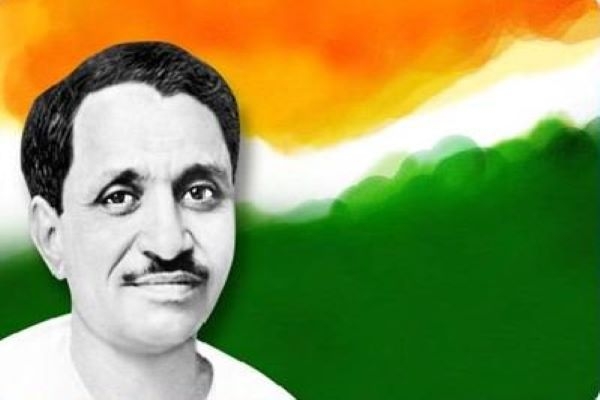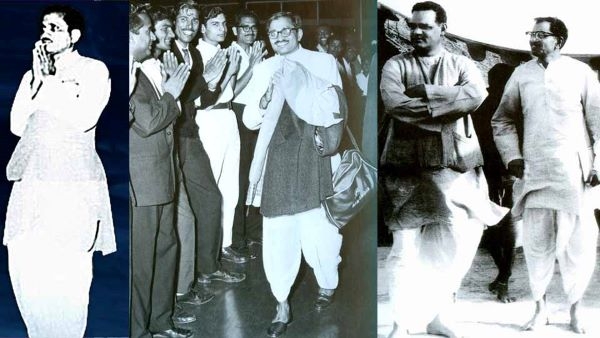Pt Deendayal Upadhyaya: A journalist par excellence...
25 Sep 2019 14:43:53
- By Lokendra Singh
New Delhi, September 25: World respectfully recognizes Pt. Deendayal Upadhyaya for his extraordinarily versatile personality. In spite of his simple look, He was an unchallenged politician, prolific orator, a responsible social thinker, an intelligent economist, educationist, writer and a veteran journalist. One could rarely find such degree of versatility in a person.

Political career of Pt. Deendayal Upadhyaya is well-known. However, his distinctness from other politicians in his period was that, he tried his best to drag ethics in politics. He wished Indian politics to be based on a strong ethical foundation. His Mantra was ‘Integral humanism’ through which he tried to take Indian politics towards highest ethical purity. Through Integral Humanism, Pt. Upadhyaya teaches us that mind, brain, soul and body are the four integral parts of human being. We can’t think of human being by excluding any of these, or we can’t think of these four components separately.
One of the important aspect of Pt. Deendayal Upadhyaya was that, he was a veteran journalist. Nobody can forget his role in Indian journalism. It will not be an exaggeration if we call him the ‘torchbearer of national journalism’. He is the person who sowed the seeds of national journalism in this country at such a time when journalism in India was highly dominated by anti-national communists. There was a need of strong alternative, which could attract Indian minds towards national integrity. Pt. Deendayal took up this challenge and there were born the periodicals like Rashtradhama, Panchajanya, Organizer, and Samacharpatra Swadesh. ‘Rashtrardharma’ was his first magazine launched in 1947.

Throughout the independence movement, media had been a great mean of integration of people which was used by almost all leaders and freedom fighters like Mahatma Gandhi, Lokamanya Tilak, Madan Mohan Malaviya, Dr. Bhimrao Ambedkar, Ganesh Shankar. All these leaders were not only accomplished leaders but the accomplished journalists as well. For the people like Pt. Deendayal Upadhyaya, journalism was not a source of income but it was a mean of sowing the seeds of nationalism among Indians. It was a vehicle to reach common Indians. He believed that media would play a vibrant role in developing public opinions on various ideologies.
We must take into account a fact that although Pt. Deendayal Upadhyaya was the pioneer of ‘national journalism’, he never publicized himself as an editor or spokesperson. He was following the principle of ‘remaining behind the curtain’, which he had learnt while working in RSS. He believed that publicity creates ego. Pt. Deendayal lived with this principle throughout his entire life. He never became the ‘principal editor’ of any of the periodical that he launched.
Pt. Deendayal laid the foundation of a new era of journalism when he launched ‘Rashtradharma’ in 1947. He appointed Atal Bihari Vajpayee and Rajiv Lochan Agnihotri as the editors. He starved for taking this magazine to the hearts of Indians. On the holy occasion of Makar Sankranti on January 14, 1948, he launched another magazine named ‘Panchajanya’, which is still popular in India. He again made Atalji as its editor, keeping himself aloof from publicity. In Panchajanya, he used to write a column named ‘Vicharvidhi’ (which was published in the English periodical ‘Organizer’ with the name of ‘political diary’). By reading this columns, one can get an idea of the depth of his knowledge of contemporary India.
His writings used to be full of nationalist thoughts, and Indian ethics. At the time when communist forces were posing threats to unity and integrity of India, Pt. Deendayal took a stand that the progress of India must be compatible with Indian culture, and not on blind replication of the western world. He writes in Panchajanya – “Today, we are busy in filling the gaps and holes lying in our nation. All proclaim to rebuild India by accelerating efforts. However, around ninety five percent of our people are not showing any urge to make passionate and right efforts to create a new India in our dream. Lack of such kind of dedication make all our efforts fruitless.”
Taking inspiration from Pt. Deendayal, many passionate Indians entered into the field of national journalism such as Atal Bihari Vajpayee, lal Krishna Adavani, Devendra Swarup, Maheshchandra Sharma, Yadavrao Dehsmukh, Rajiv Lochan Agnihotri, Vachanesh Tripathi, Mahendra Kulashreshtha, Girish Chandra Mishra, and so on. All of them followed the path laid down by Pt. Upadhyaya.
Dr. Maheshchandra Sharma, editor of a book throwing light on the career of pt. Deendayal, tells an interesting story. An article was to be published in Panchajanya related to the stay of hunger of Sant Fatehsingh. The article was titled as ‘Akaltakht ke kaal’. Deendayalji rejected this title and convinced that one should not use such kind of hurtful language in media. It will pose threat to unity. Despite being the pioneer of vibrant national media, he was very conscious about language and manners of expression. In 1953, the then editor of Panchajanya, Mahendra Kulasreshta, in his editorial on partnership strategy of Ashok Mehta with the then government, had used the word ‘Murkhatapurna’ (foolish). Deendayalji convinced the editor that maintenance of polite language is essential to retain the status and prestige of Panchajanya.
If Deendayalji hadn’t chosen politics as a field of career, he would have definitely made much greater contribution to national journalism. Had he spent bit more time for the progress of national journalism, we might have seen a different picture of journalism from what we see today. Today’s media and journalists must follow the path that Pt. Deendayal Upadhyaya has shown.
